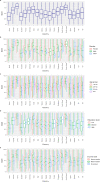COVID-SCORE: A global survey to assess public perceptions of government responses to COVID-19 (COVID-SCORE-10)
- PMID: 33022023
- PMCID: PMC7538106
- DOI: 10.1371/journal.pone.0240011
COVID-SCORE: A global survey to assess public perceptions of government responses to COVID-19 (COVID-SCORE-10)
Abstract
Background: Understanding public perceptions of government responses to COVID-19 may foster improved public cooperation. Trust in government and population risk of exposure may influence public perception of the response. Other population-level characteristics, such as country socio-economic development, COVID-19 morbidity and mortality, and degree of democratic government, may influence perception.
Methods and findings: We developed a novel ten-item instrument that asks respondents to rate key aspects of their government's response to the pandemic (COVID-SCORE). We examined whether the results varied by gender, age group, education level, and monthly income. We also examined the internal and external validity of the index using appropriate predefined variables. To test for dimensionality of the results, we used a principal component analysis (PCA) for the ten survey items. We found that Cronbach's alpha was 0.92 and that the first component of the PCA explained 60% of variance with the remaining factors having eigenvalues below 1, strongly indicating that the tool is both reliable and unidimensional. Based on responses from 13,426 people randomly selected from the general population in 19 countries, the mean national scores ranged from 35.76 (Ecuador) to 80.48 (China) out of a maximum of 100 points. Heterogeneity in responses was observed across age, gender, education and income with the greatest amount of heterogeneity observed between countries. National scores correlated with respondents' reported levels of trust in government and with country-level COVID-19 mortality rates.
Conclusions: The COVID-SCORE survey instrument demonstrated satisfactory validity. It may help governments more effectively engage constituents in current and future efforts to control COVID-19. Additional country-specific assessment should be undertaken to measure trends over time and the public perceptions of key aspects of government responses in other countries.
Conflict of interest statement
The authors have declared that no competing interests exist.
Figures
References
-
- Johns Hopkins Coronavirus Resource Center. COVID-19 Map [Internet]. 2020 [cited 2020 May 11]. Available from: https://coronavirus.jhu.edu/map.html
-
- Hale T, Angrist N, Kira B, Petherick A, Phillips T, Webster S. Variation in government responses to COVID-19 [Internet]. 2020 [cited 2020 Jul 9]. Available from: www.bsg.ox.ac.uk/covidtracker
-
- Muto K, Yamamoto I, Nagasu M, Tanaka M, Wada K. Japanese citizens’ behavioral changes and preparedness against COVID-19: An online survey during the early phase of the pandemic. Ojima T, editor. PLoS One [Internet]. 2020. [cited 2020 Jun 17];15(6):e0234292 Available from: https://dx.plos.org/10.1371/journal.pone.0234292 - DOI - PMC - PubMed
-
- Sibley CG, Greaves LM, Satherley N, Wilson MS, Overall NC, Lee CHJ, et al. Effects of the COVID-19 Pandemic and Nationwide Lockdown on Trust, Attitudes Toward Government, and Well-Being. Am Psychol [Internet]. 2020. [cited 2020 Jul 9]; Available from: https://pubmed.ncbi.nlm.nih.gov/32496074/ - PubMed
-
- Seale H, Heywood AE, Leask J, Sheel M, Thomas S, Durrheim DN, et al. COVID-19 is rapidly changing: Examining public perceptions and behaviors in response to this evolving pandemic. Tu W-J, editor. PLoS One [Internet]. 2020. June 23 [cited 2020 Jul 9];15(6):e0235112 Available from: https://dx.plos.org/10.1371/journal.pone.0235112 - DOI - PMC - PubMed


